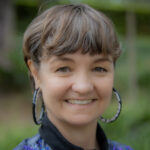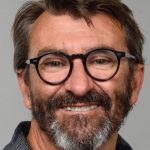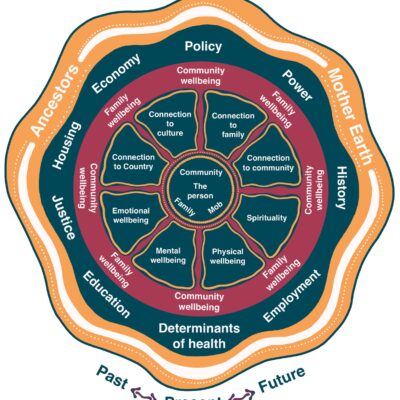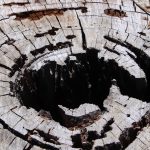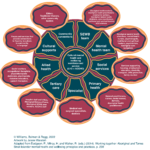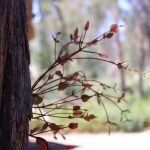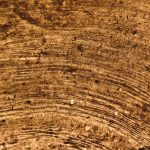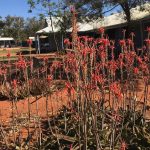
February 2023
Download Aboriginal people’s holistic view of health PDF
It is well-known that Aboriginal people understand health holistically. Yulang has developed the diagram below to show this. This can be quite different to how non-Aboriginal people and western health sciences understand health.
First, it is important to say that Yulang respects the National Aboriginal Community-Controlled Health Organisation (NACCHO) definition of health:
“Aboriginal health” means not just the physical well-being of an individual but refers to the social, emotional and cultural well-being of the whole Community in which each individual is able to achieve their full potential as a human being thereby bringing about the total well-being of their Community. It is a whole of life view and includes the cyclical concept of life-death-life. (NACCHO, n.d.)
The NACCHO definition of health has been used in the view shown below. Yulang developed this during our work on a model of mental health and wellbeing care for Aboriginal people in with the NSW Ministry of Health (Williams & Ragg, 2022).
Figure 1: Aboriginal people’s holistic view of health

Copyright Williams, Ragg & Bulman, 2022. Artwork by Jessie Waratah
Yulang worked with Mibbinbah Spirit Healing and together we critically reflected on our own experiences, and on the perspective developed by Aboriginal-Chinese psychologist Dr Graham Gee et al. (2014). We carried out repeated action research cycles with Aboriginal people working in health and mental health roles, particularly the NSW Aboriginal Mental Health Clinical Leadership Group.
The view that we have drawn places Aboriginal people at the centre, and not alone. Family, community and mob are there, with us.
The individual person and mob are surrounded by eight elements of health and wellbeing that Aboriginal people often talk about: emotional wellbeing, mental wellbeing, physical wellbeing, spirituality and connections to Country, culture, family and community. The wellbeing of family and community are important, not just the individual.
We recognise many things influence individual and mob health and wellbeing – the determinants of health and wellbeing, such as policy, power, history, employment, education, justice, housing and the economy are strong influences.
Surrounding us all are our ancestors and connection to Country – our Mother Earth, spirits of the land and air and waterways.
We acknowledge the influences of time – the past, the present and visions for the future.
Supporting holistic health and wellbeing needs clear principles, healthy relationships and healing, critical self-reflection and critical thinking, resources, data, evaluation, trained, skilled and supported workforces, partnerships, and more.
Follow the links to see our starburst publications on these and let us know any feedback.
Recommended citation
Williams, M., Ragg, M., & Bulman, J. (2023). A holistic view of health. Yulang Indigenous Evaluation. https://yulang.com.au/starburst-indigenous-evaluations/holistic-health/
References
Gee G, Dudgeon P, Schultz C, Hart A, and Kelly K (2014). ‘Social and Emotional Wellbeing and Mental Health: An Aboriginal Perspective’. Chapter 4, in Dudgeon P, Milroy M, and Walker R(eds.) (2014). Working together: Aboriginal and Torres Strait Islander mental health and wellbeing principles and practice – revised edition. Canberra: Australian Government. p.55.
National Aboriginal Community Controlled Health Organisation (NACCHO). (n.d.). Aboriginal Community Controlled Health Organisations. https://www.naccho.org.au/acchos/
Williams, M., & Ragg, M. (2022). Aboriginal mental health and wellbeing model of care. NSW Ministry of Health, in press.
